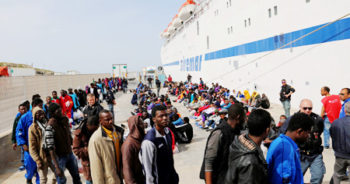The International Organisation for Migration (IOM) has urged the Nigerian Government to tackle the root causes of conflicts to end humanitarian crises.
The Chief of Mission of IOM in Nigeria, Enira Krdzalic, made the call on Tuesday in Abuja during the 2016 Annual National Dialogue with the theme on “Policy Coherence in Migration Governance’’, and sub-theme “Managing Migration and Displacement: The way forward’’.
According to Krdzalic, until the root causes of conflicts are addressed, Nigerians will continue to make desperate and dangerous trips across the Mediterranean Sea and the Sahara desert in search for safety and greener pastures.
“The challenges of migration and displacement cannot be durably resolved without commitments to tackle the root causes of conflicts because if not addressed, it is bound to cause repeated patterns of humanitarian crises.
“Unless the displaced populations are effectively stabilised through adequate protection and assistance, there can be little hope in achieving sustainable peace.
“Governments should also ensure that displaced persons can re-establish peaceful and productive lives and do not remain in protracted displacement,” she said.
Krdzalic said that the current displacements in the country have contributed drastically in hampering the development of Nigeria as huge resources have been deployed to address issues of displacement.
The IOM chief said with the global estimate of 15.5 million refugees and 10.5 million Internal Displacements in mid-2016, the year marks the highest level of forced displacement since World War 2.
She said in Nigeria, the IOM Displacement Tracking Matrix (DTM) as at October 2016 estimated that more than 1.8 million Nigerians are displaced and living in camps and host communities.
However, she commended the Nigerian Government for ratifying the African Union convention for the Protection and Assistance of Internally Displaced Persons (Kampala Convention).
While urging African governments to urgently domestic the laws, Krdzalic said it was imperative for Nigeria to ensure that its sectorial policies were coherent and in tune with the National Migration Policy to avoid duplication and ensure efficiency.
She also advised the Nigerian government to develop advocacy programmes against irregular migration in schools, markets, worship places and communities on the dangers of illegal migration.
Besides, she urged stakeholders to engage in a fruitful dialogue to proffer solution to the global menace of irregular and dangerous migration.
On her part, Sadiya Farouq, the Federal Commissioner, National Commission for Refugees, Migrants and IDPs, said the annual dialogue is organised to mark the International Migrants’ Day celebrated on December 18 annually.
She said this years’ theme was crafted to reflect the next step, policy direction and actions to be undertaken to address the peculiar challenge of displacement in Nigeria.
Farouq said this is in relation to the global focus on addressing the large movement of refugees and migrants of the 2016 United Nations General Assembly.
She said the dialogue was inspired by the need to go beyond the rhetoric of just observing the International Migrants’ Day to include evolving concrete and practical approach to addressing the displacement crises.
The federal commissioner said it would also raise awareness about the Nigerian migratory landscape, and address the internal and international emerging trends in migration.
Copyright Ships & Ports Ltd. Permission to use quotations from this article is granted subject to appropriate credit given to www.shipsandports.com.ng as the source.

